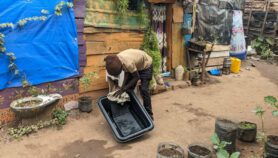By: Maina Waruru
Send to a friend
The details you provide on this page will not be used to send unsolicited email, and will not be sold to a 3rd party. See privacy policy.
[NAIROBI] The Chinese president has promised to increase science, technology and innovation (STI) assistance to Africa, although experts from the continent warn assistance will only work if it is Africa-led and promotes sustainable development.
President Hu Jintao has pledged to expand China-Africa collaboration in science, through maintaining successful research programmes and supporting new initiatives in agriculture, health, water, forestry and meteorological technologies, as well as capacity building.
"China will implement the ‘African Talents Program’ to train 30,000 personnel in various sectors for Africa, offer 18,000 government scholarships, and build cultural and vocational skills training facilities," Hu told the fifth Forum on China-Africa Cooperation (FOCAC), in Beijing, China, last month (19–20 July).
He said that medical and health cooperation will also be enhanced: "China will […] send 1,500 medical personnel, and continue to carry out ‘Brightness Action’ activities in Africa to provide free treatment for cataract patients."
Hu added that China and Africa should strengthen exchanges in education and science, and work harder to carry out advanced cooperation in technology transfer.
He highlighted existing initiatives, such as the China-Africa Joint Research and Exchange Plan for which he pledged continued support, adding that China would "sponsor 100 programmes for research, exchange and cooperation by academic institutions and scholars of the two sides".
"China has trained close to 40,000 African personnel in various sectors, and provided over 20,000 government scholarships to African countries […] Twenty pairs of leading Chinese and African universities have entered into cooperation under the 20+20 Cooperation Plan for Chinese and African Institutions of Higher Education," Hu said.
African experts have welcomed the pledges and see China as potential science partner. But they warned that mere technology transfer using traditional models of aid will do little to help the continent develop sustainably.
"We have known China as being strong in [creating] infrastructure development in Africa, but there is little data to show they have cooperated with the continent in areas of STI," said Eric Aligura, programmes coordinator at the Kenya Institute of Public Policy and Analysis.
He pointed out that Africa still relies on traditional western partners in the field of science collaboration, but said China could become an important new collaborator.
Others questioned whether the new pledges would have a lasting impact and were sustainable in the long run.
"For [China] to support the continent fruitfully, it must prioritise ‘socio-technological transitions’ — for example building African capacities in STI for sustainable development," said Kevin Urama, executive director of the African Technology Policy Studies network (ATPS).
In contrast, business-as-usual models for transferring knowledge, skills and funds could lead to continued dependency, he added.
"While the Chinese initiatives are welcome, we must realise that they will only be successful if they are Africa-led and designed to build ownership by African countries."
For example, Urama said, "while sending medical personnel to Africa will provide short-term welfare benefits to patients, a more sustainable strategy would be to engage these experts in the development of African [medical] knowledge".
Countries "cannot be developed from the outside", and solutions lay with African countries rising to meet their development needs and working with partners, including China, to develop indigenous STI capacities, Urama added.













